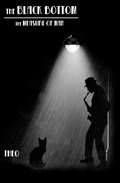
 |
It is 1927, and Kaleb Kierka owns a speakeasy in downtown Detroit. He learned this from a detective after waking up from several weeks in a coma with amnesia. He had been beaten severely and left for dead, but he somehow survived. As the people who know him try to fill in the missing pieces, he learns he is also a renowned jazz pianist, has ties to the Purple Gang—which supplies booze to Detroit and Al Capone—and is in love with a troubled heroin addict who is also a gifted singer. His speakeasy lies on the border of the black and white working-class neighborhoods and caters to both. In addition, one of the lowest-class heroin gangs has intentions to take over his club through any means necessary. Kaleb knows he is a marked man and starts to believe there is a mole in his own circle, but he is running out of time.
As a musician and writer, Czuk uses his familiarity with each as he composes his sentences. The wordplay he employs is like that employed by many of the Beat writers. It is a mix of lyricism and metaphor designed to imitate the movements and beats of jazz. Some of his sentences are extremely poetic, and the reader will enjoy savoring those moments. Often, when a writer experiments and plays with language in the manner of Czuk, there are bits that don’t quite work or that come off as too pat. That happens here occasionally as well. However, readers interested in noir fiction and those who enjoy jazz will still find a pleasurable read they will likely share with their friends.
A 2020 Eric Hoffer Book Award Category Finalist
RECOMMENDED by the US Review